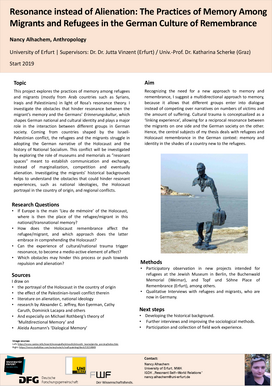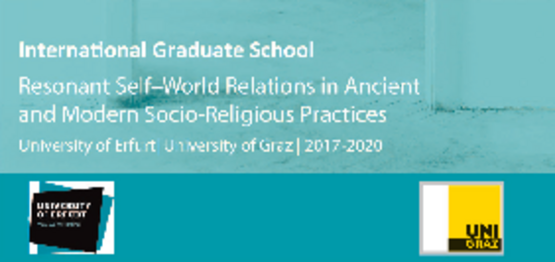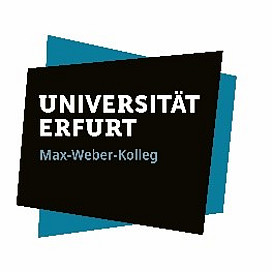Nancy Alhachem
Resonance instead of Alienation: The Practices of Memory among Migrants and Refugees in the German Culture of Remembrance
This project explores the practices of memory among refugees and migrants (mostly from Arab countries such as Syrians, Iraqis and Palestinians), in the light of Rosa’s resonance theory, which suggests ”thinking and feeling in exchange”, to allow the other, whether it is a person, an object or, a memory, to be touched by it and result in an affect that is felt individually. My project will investigate the obstacles that could hinder this resonance between the migrant’s memory and the Germans’ Erinnerungskultur. A substantial part of the latter is focused on the coming to terms with the Holocaust, and therefore shapes German national and cultural identity. It also plays a major role in the interaction between different groups in German society. Coming from countries shaped by the Israeli-Palestinian conflict, the refugees and the migrants struggle in adopting the German narrative of the Holocaust and the history of National Socialism. This conflict will be investigated by exploring the role of museums and memorials. These are assumed as a ”resonant space”, where memories enter in communication and exchange, instead of marginalization, competition and eventually alienation. Investigating the historical background from which the migrants come, helps understanding the obstacles that could hinder a resonant experience, such as national ideologies, the portrayal of the Holocaust in the country of origin, and the conflict that affected the region. I therefore suggest a multidirectional approach to memory, because it allows that different groups enter into a dialogue instead of competing with each other over narratives on numbers of victims and the amount of suffering. Cultural trauma is conceptualized as a ‘linking experience’, allowing for a reciprocal resonance between the migrants on one side and the German society on the other. Hence, the central subjects of my thesis deals with the refugees and the Holocaust remembrance in the German context, memory and identity in the shades of a country new to the refugees.
My research takes its starting-point from the need of a new approach to memory and remembrance, recently initiated by a number of German and American academics, to deal with the problems arising in multicultural societies. I refer particularly to Michael Rothberg and his theory of ‘Multidirectional Memory’ and Aleida Assmann’s ”Dialogical Memory”, in order to establish the resonance theory in the field of memory and migration studies. The central hypothesis of this thesis suggests that, instead of making the migrant a passive receptor of the German remembrance, which will alienate him/her and push towards the formation of parallel societies, a resonant experience of memory and history, will allow both groups to identify and sympathize with each other.





